
In the past, developers have had to put up with long hours and a lack of flexibility in order to climb the corporate ladder.
Today’s developers have higher expectations of what they want from a job.
They no longer want to settle for just a well-paying job—they want to be part of a company that offers the best combination of financial benefits, professional development, positive work culture, work-life balance, and other perks.
In this article, we’ll take a look at the top 10 things developers want in their jobs and explore examples of companies that excel at providing them.
So, let’s dive in!
Table of Contents
Financial incentives
Developers are well-aware of their worth, and they expect to be compensated accordingly.
After all, their skills and expertise are in high demand, and they have many options when it comes to finding a new job.
If companies don’t offer them what they feel is adequate compensation, they’ll likely look for new career opportunities elsewhere.
This claim is supported by the Stack Overflow survey, which found that a fair salary is the most important factor in developer happiness.
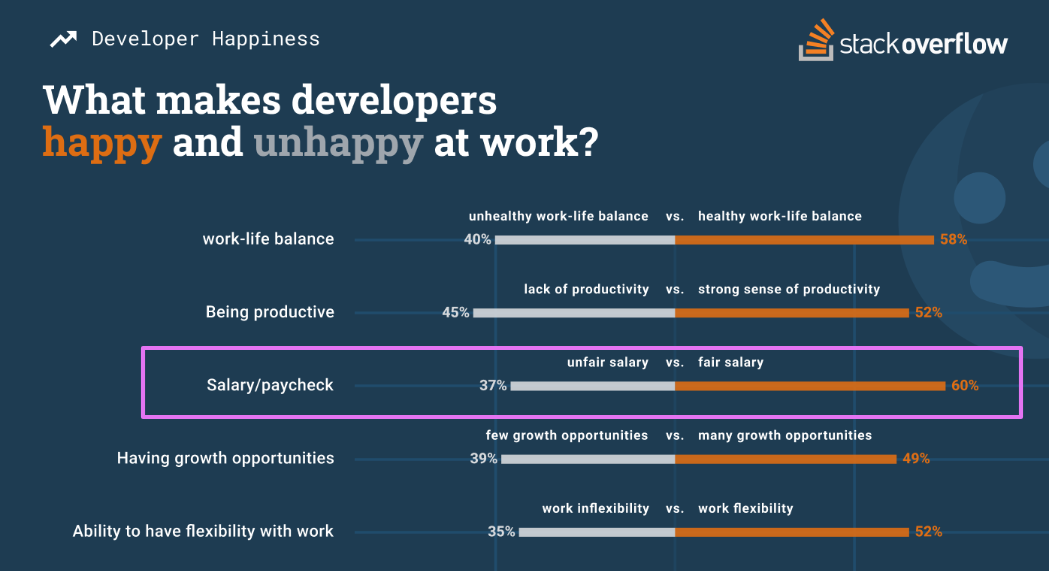
In addition, out of 74% of developers who are either actively looking for a new job or open to the possibility, 65% listed salary as their main reason for wanting to change jobs.
Considering all these numbers, it’s safe to say that financial compensation isn’t something developers are willing to forgo.

Get unreal data to fix real issues in your app & web.
The good news is that companies don’t need to break the bank to win over today’s tech talent.
They just need to provide them with attractive financial incentives, such as bonuses and stock options, on top of their base salary.
Thomas Griffin, co-founder and president of OptinMonster, believes bonuses tied to results are crucial for any company that wants to keep its best developers.
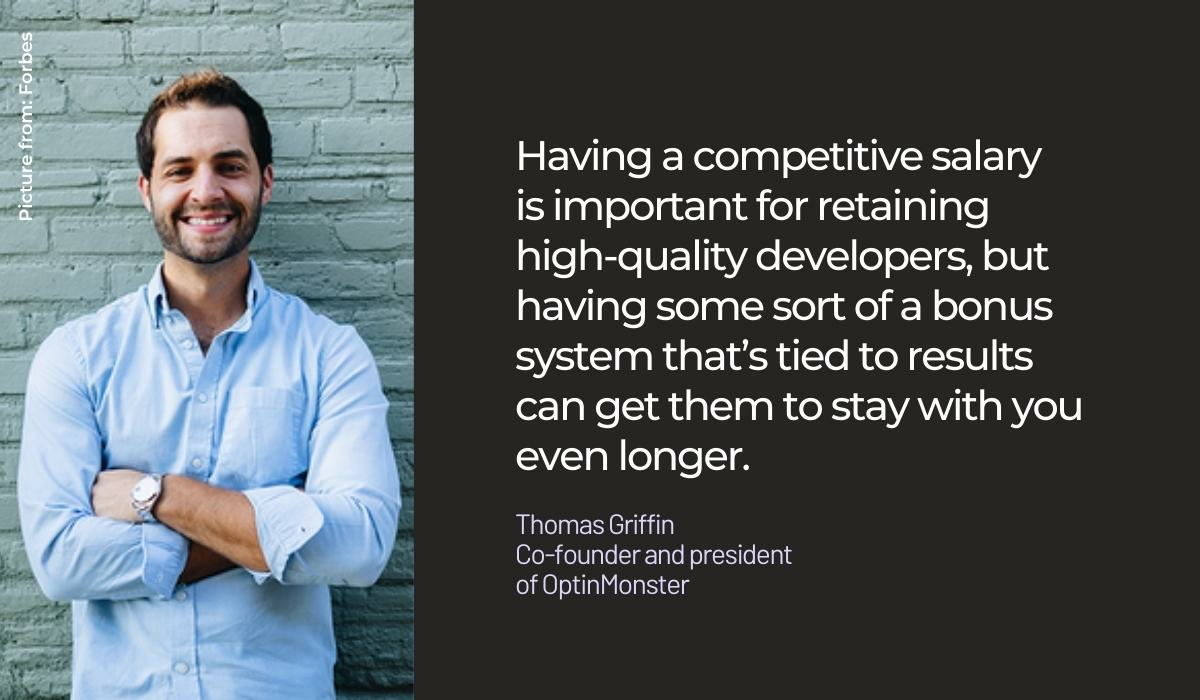
Some companies, he explains, offer developers stock incentive programs, while others may choose a profit-sharing plan.
Either way, it’s important to find a way to incentivize developers in a way that increases retention.
If they feel like their salary and other bonuses are stagnant while their skills continue to grow, they just might leave your company for greener pastures.
Meaningful work
Employees today want to work on projects whose impact will be felt beyond the immediate task at hand and be involved in assignments that make a difference in society.
A Gartner study describes this trend as the Great Reflection, in which more employees than ever before are starting to reflect on their lives and work after experiencing the pandemic.
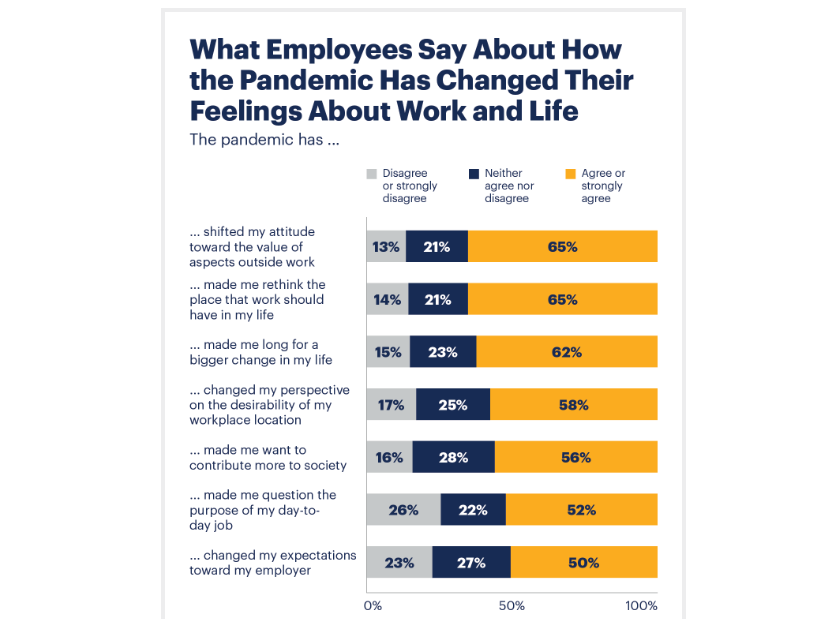
Employees are wondering what makes them happy, how much impact their work has, and how they can contribute to society.
Or how Chris Howard, the Global Chief of Research at Gartner, states:
“People want purpose in their lives—and that includes work. The more an employer limits those things, the higher the employee’s intent to leave.”
Developers have also been greatly affected by the Great Reflection, and according to Hired’s survey, they want to make their mark on some of the biggest problems society is facing today.
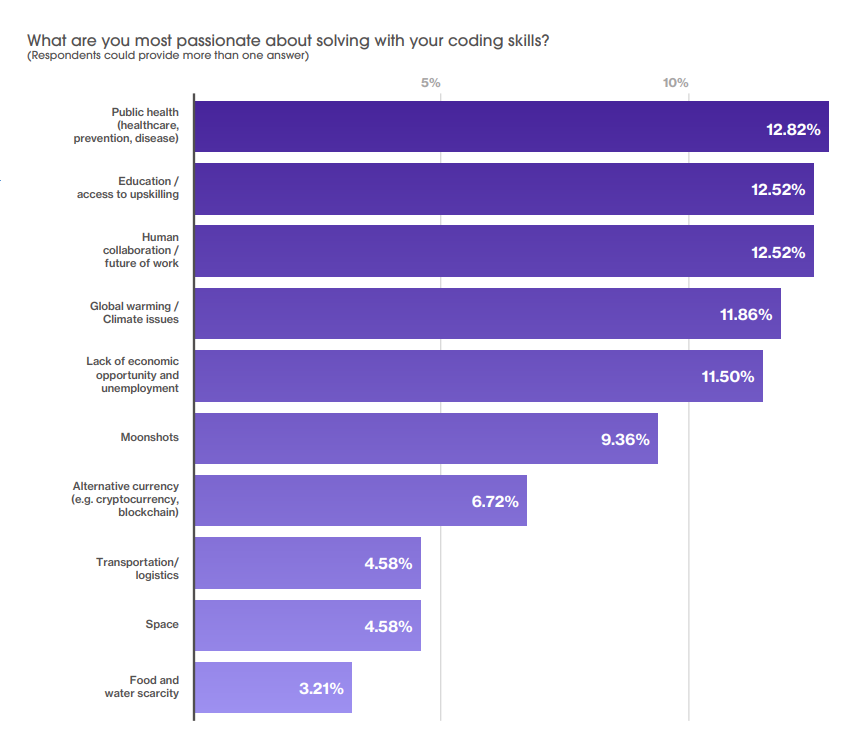
As the picture above shows, when asked about the issues they’re most passionate about solving, they indicated that public health and education top their list and also named the future of work, climate issues, and unemployment as things that mattered to them.
That means that in order to retain developers, companies will need to reconsider their work cultures, make space for contributions that go beyond just code, and focus on the projects that make a real impact on the community.
Creative freedom
Developers often have an inherent capacity for creativity, and if they can’t explore new ideas at their current job, they’ll likely seek positions where their innovative spirit is more encouraged.
That’s why many companies allow developers to work on passion projects during work hours, enabling them to explore their creative side.
Swish Goswami, the CEO and co-founder of Surf, highly recommends this approach, as it can be beneficial not only for the developers but for the company as well.
After all, he states, WeChat, the wildly successful mobile messaging application, was created by an employee who pitched the idea to superiors.
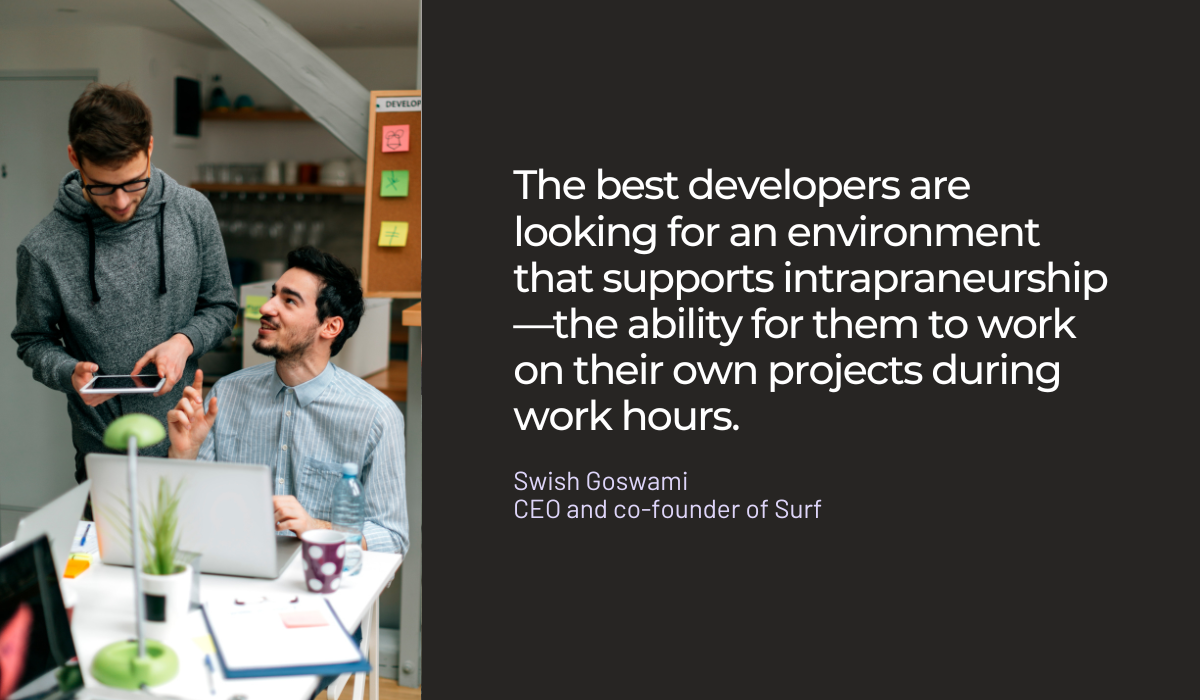
When developers are allowed to explore new ideas, they become more engaged in their work in general and are more likely to stick around.
For example, Google has gotten a reputation for encouraging employees to work on pet projects and side ideas during their paid time at work—a policy called 20% time.
They went even further with Area 120, their in-house incubator, where employees get a chance to develop their ideas and launch their own startups without having to leave the company.
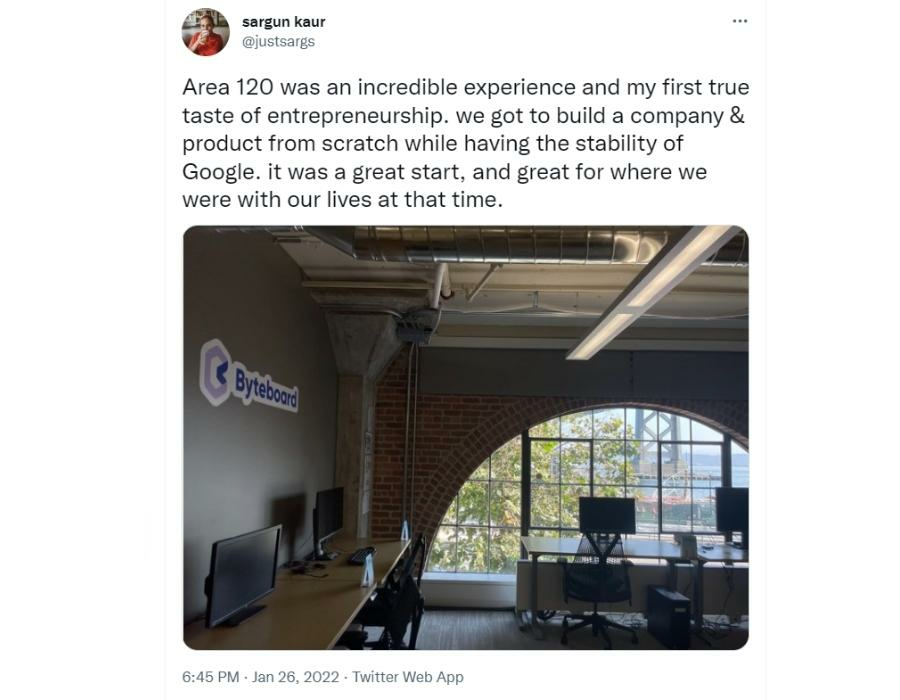
That way, they’re allowing employees not only to experiment and innovate on the job but also to potentially monetize their ideas.
Developers have a lot to offer in terms of creativity and most likely will not want to work for a company where their innovative spirit is neglected.
Therefore, by encouraging innovation, listening to their ideas, and providing them with the tools necessary to turn those ideas into reality, companies can ensure that their best employees will stay with the company for a long time.
Challenging projects
It’s easy to fall into the trap of giving your developers the same tasks over and over again.
This approach, however, can quickly lead to their disengagement and possible departure from the company.
According to a survey conducted by Hired, 72.2% of software developers said that new challenges and the opportunity for continuous learning were their biggest motivators for entering the field in the first place.
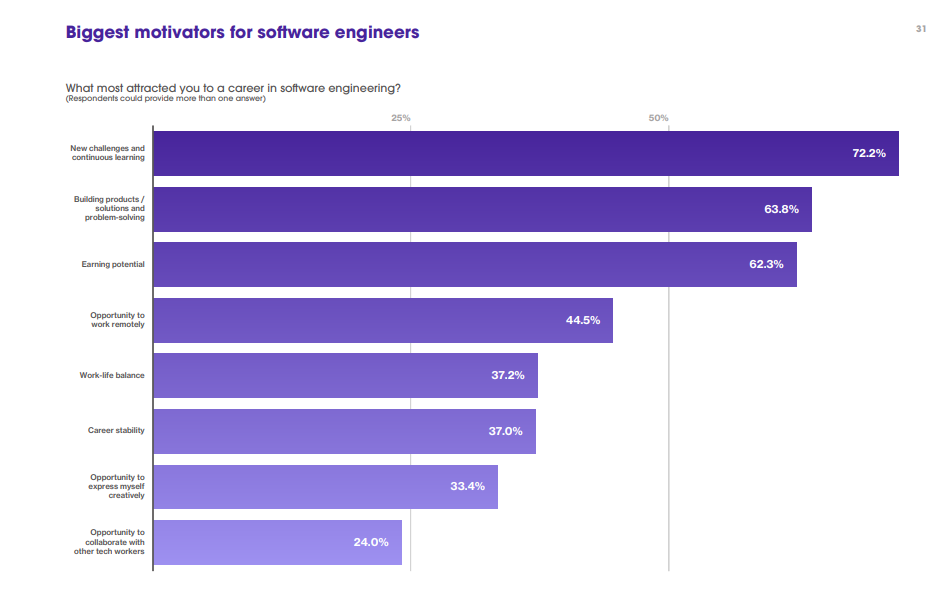
Even after they start working, it’s safe to assume that their desire for new challenges won’t vanish overnight—it’ll still matter.
Bruno Marnette, the vice president at Two Sigma, is living proof of this. In his blog post, he described how, early in his career, he was working on a project that initially thrilled him.
But after a year of doing essentially the same thing every day, the initial excitement faded away, and he felt unchallenged because there was nothing new left for him to learn.
And as you can see below, he eventually found himself at a dead end and quit his job.

The whole experience made him think differently about developers’ work.
As a result, when he later started his own company, he implemented a fast-rotation policy: no one would be allowed to work on the same project for longer than three months.

This prevented developers from getting stuck in a rut, and kept boredom at bay during longer-lasting projects.
Of course, companies don’t have to rotate developers in and out every three months.
However, it’s a good idea to make sure that you provide your developers with the opportunity to work on interesting projects so that they don’t feel like their skills are stagnating.
Otherwise, they might jump ship for another job that will challenge them more.
Professional development
The pace of technological change has quickened, making it more important than ever for developers to keep track of new trends and technologies so that they don’t fall behind.
That’s why many of them spend a good chunk of their time learning new skills and honing existing ones, as they’re worried that their current skill set will become outdated.
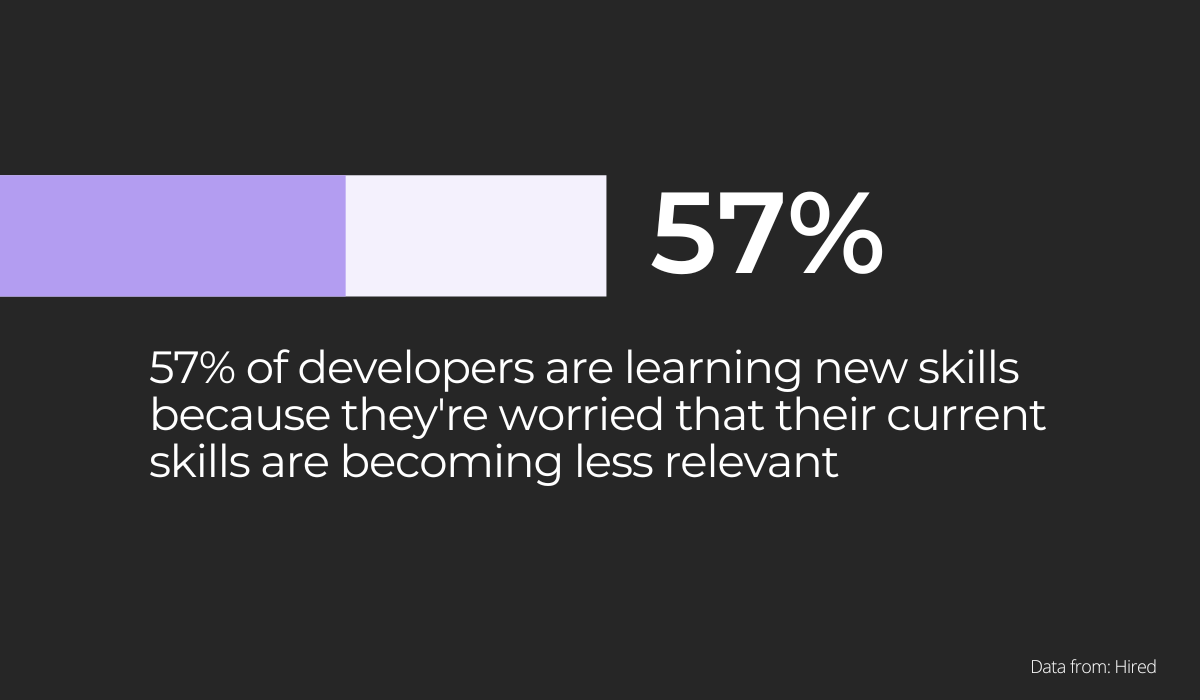
The fact is that software engineering is a career that requires constant learning.
Even if developers have been working in the field for years, there are always new technologies and frameworks to master and new languages to learn in order to stay competitive.
And that’s a lot of pressure to deal with.
In light of these considerations, no wonder that 56% of developers cite opportunities to learn as one of the most important factors for them to stay in the company.
On the other hand, it’s also not a surprise that companies try to attract developers with the possibility to learn new technologies, get mentorship and training, or attend conferences.
For example, Greenhouse Software organizes regular lunch-and-learns where developers have the chance to learn from their peers or present topics they’re enthusiastic about.

They also give their employees a yearly budget to spend on books, workshops, and conferences related to technology.
In today’s software development world, this kind of approach has become a norm for most companies.
If they want to draw the best developers—and keep them around once they’re on the team—it’s necessary that they offer them the chance to learn, grow and stay up-to-date in their field.
An impressive team
Developers thrive when surrounded by other experts who share their knowledge with them, provide mentorship, and challenge them intellectually.
It’s easy, therefore, to understand why they so eagerly want to work for Google, Amazon, Meta, and Apple—companies where they can collaborate with some of the best developers in the world.
Just look at what Edmond Lau, author of The Effective Engineer, has to say about working at Google and learning from the best and brightest minds in the field.
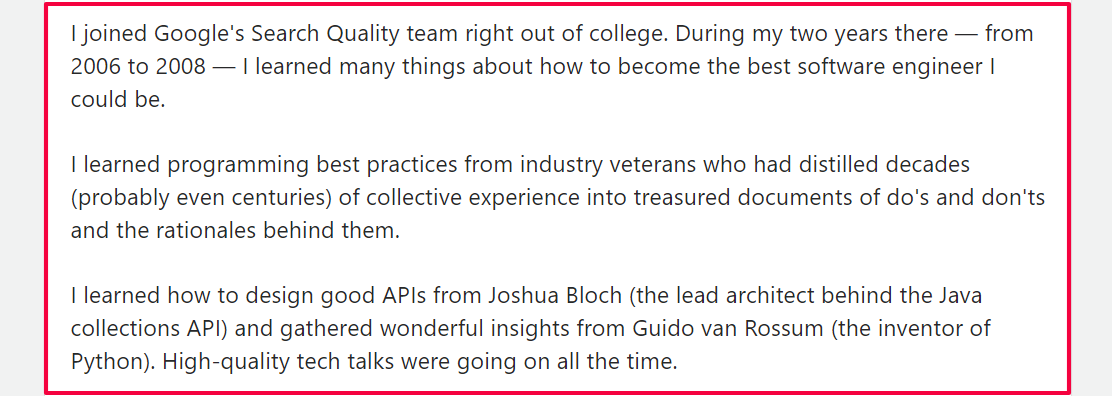
As you can see, he had a chance to learn from some of the most impressive developers in the industry.
Who wouldn’t want to be in his shoes?
Having access to talented developers and tech leads on a daily basis is a huge benefit for any developer, and it can help them develop their skills in leaps and bounds.
Elye, a software developer and writer for Better Programming, agrees with this when he states that he has benefited immensely under strong tech leaders who mentored him throughout the years.
He even stayed at the company longer than expected because of the opportunity to learn from them.

Many developers would relish the opportunity to join a development team which is already making waves in the industry.
Therefore, if companies want to attract and keep talented developers, they should create opportunities for those developers to become experts in their fields.
The stronger the team, the more skills and experience its members will have—and hence a greater ability to share knowledge and expertise.
An opportunity to work with clients
Developers often like working directly with clients, and there are many good reasons for preferring this arrangement.
For starters, it can be a great motivation boost for them to meet the clients whose daily life was impacted by their code.
By seeing the code in action, they can also get a better understanding of how it fits into the larger picture and thus make better technical decisions.
That’s exactly what Daniele Beccari, the chief product officer of HealthHero, thinks.
As a young software developer just starting out, he had an opportunity to speak directly with a client—and saw firsthand how this could be valuable.
“We spent the rest of the meeting watching how they actually used our KoolProduct, we were able to answer a couple of questions on the fly, and we got feedback on some of the new ideas we were considering.”
The problem is that developers rarely have any direct contact with clients, who are generally insulated from the development process by a chain of command that might look like the following.

These intermediates are necessary to ensure a project’s success. However, they can also create a lot of distance between developers and clients.
Although it’s not possible for developers to attend every client meeting, it’s easy to see why they find it important to meet with them occasionally.
It helps them to understand what needs to be built and how it fits into the overall project, and it also gives them a chance to explain technical details that might not have been fully understood by the client or account manager.
A positive company culture
Some say that people leave managers, not companies.
While this is true to some extent, it doesn’t mean that companies don’t matter.
What a company has to offer when it comes to culture can have a major impact on how happy employees are at work—it can affect the way people interact with each other and how they approach their jobs.
Let’s just mention one example.
According to Officevibe, 69% of employees would work harder if they felt their efforts were better appreciated.
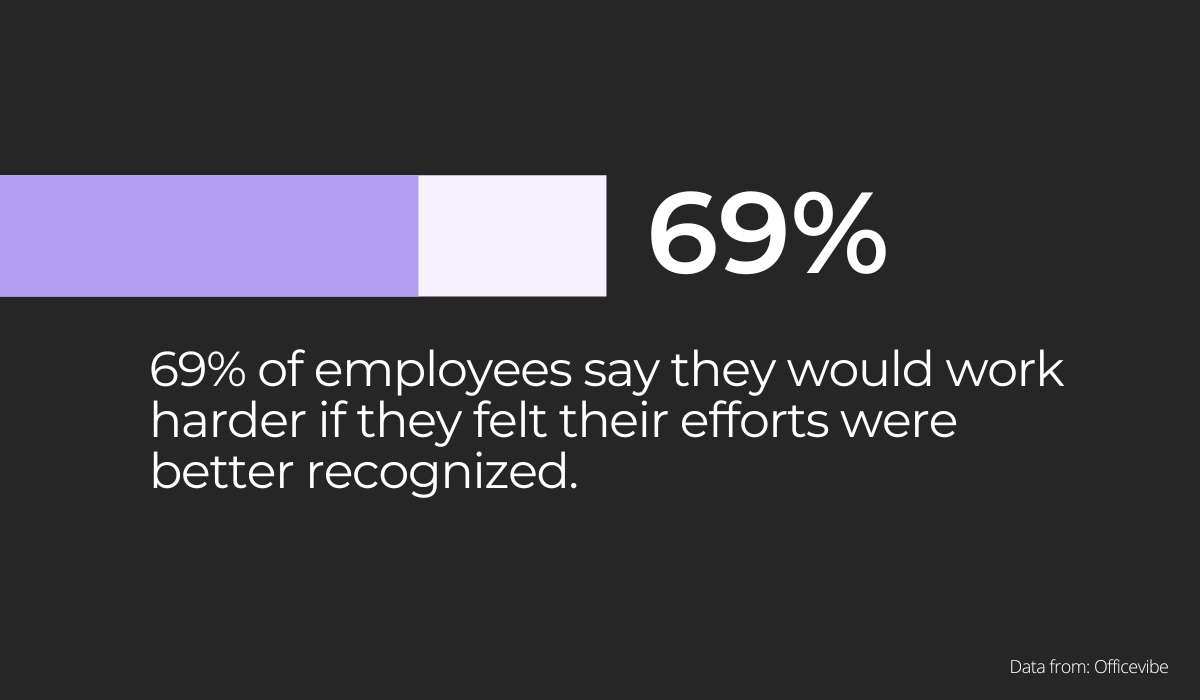
That is a truly staggering number, indicating that a vast majority of employees don’t feel valued by the company and that if the culture were more appreciative, they would be more motivated to give their best.
Developers, too, want to work for a company that treats them well and appreciates their hard work.
In fact, 37% of them cite not being valued as a reason why they would leave their current job.
Or, as Michael Brook, the chief innovation officer and co-founder of Pitchly, interestingly puts it:
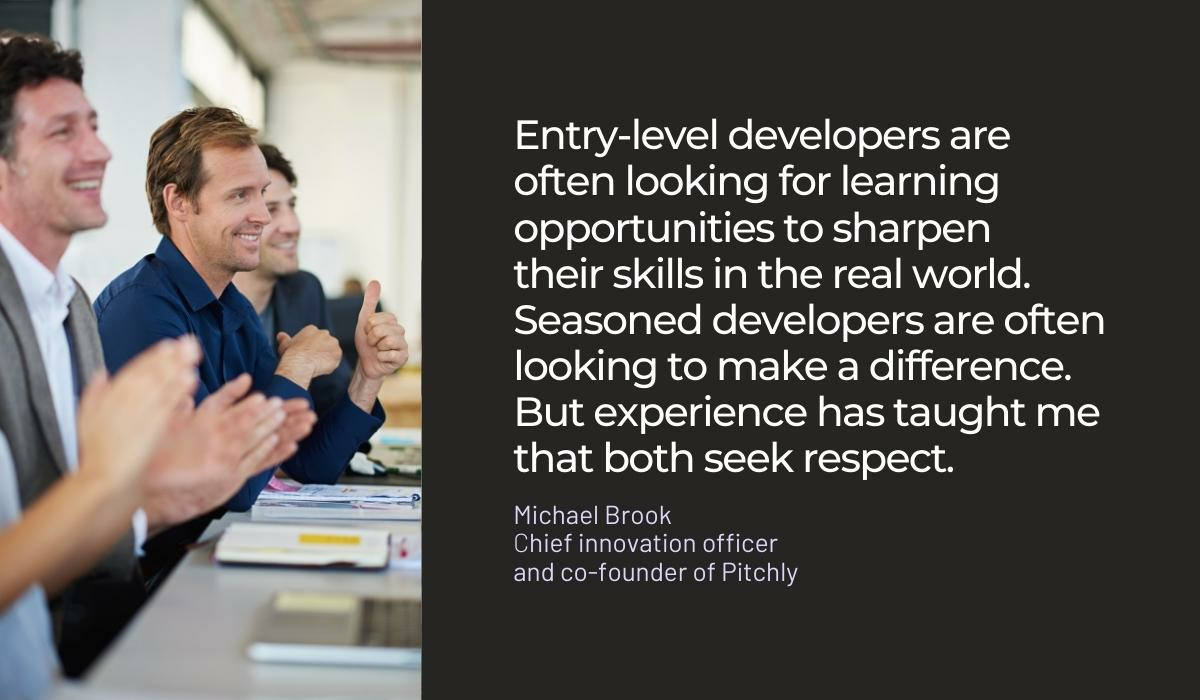
Of course, there’s more to a positive culture than being appreciated and respected by peers and superiors.
A positive culture is one in which developers are encouraged to solve problems instead of blaming each other and where they feel safe making mistakes.
The one that encourages them to learn and grow, as well as rewards them for their efforts.
Creating such a culture is not just important but essential for retaining the company’s top talent.
A good work-life balance
According to Stack Overflow, a healthy work-life balance is, after a fair salary, the second major factor that affects developers’ happiness the most.
This means that developers won’t stay long with a company if the perks aren’t good enough—like remote work, fewer working hours, vacation days, and even a day off once in a while.
For example, Buffer is often the first choice of many developers because the company is known for its policies that support a good work-life balance.
For starters, their employees work remotely, which gives them the freedom to live where they want, whether it’s their hometown or a place they love visiting in the summer.
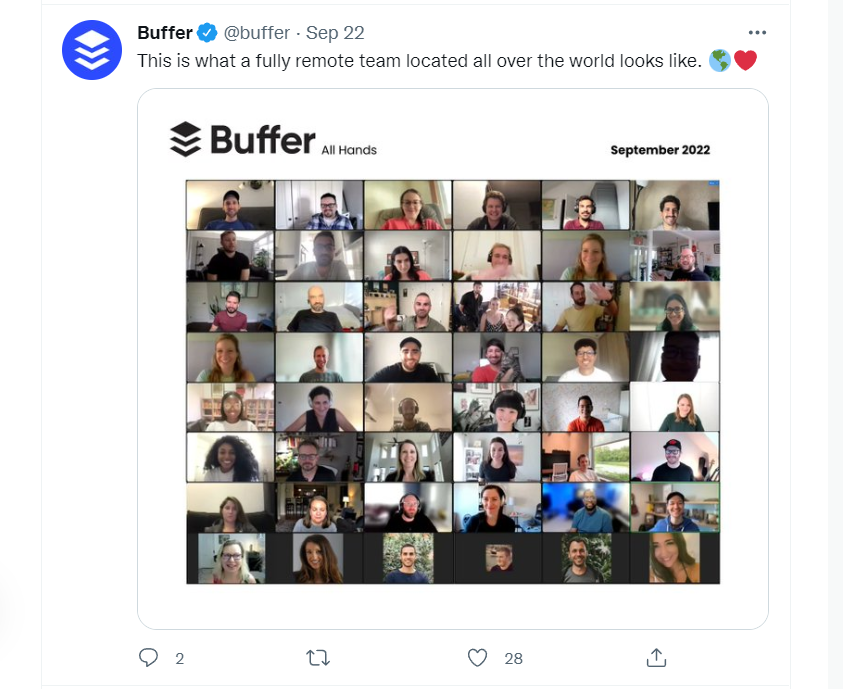
In 2020, the company also implemented a 4-day workweek and has flourished ever since.
In fact, its overall productivity and employee happiness grew 91%—thanks to this change.
Just take a look at one of their iOS developers’ thoughts on Fridays off, and you’ll quickly get an idea of just how much this initiative can improve the work-life balance of your employees.

RingCentral, a provider of cloud-based communication and collaboration services, is also on the same page, as they put special emphasis on the well-being of their employees.
They offer unlimited PTO, paid sick leave and fitness classes, healthy lunches at work, and access to mental health professionals if the employees feel the need for counseling.
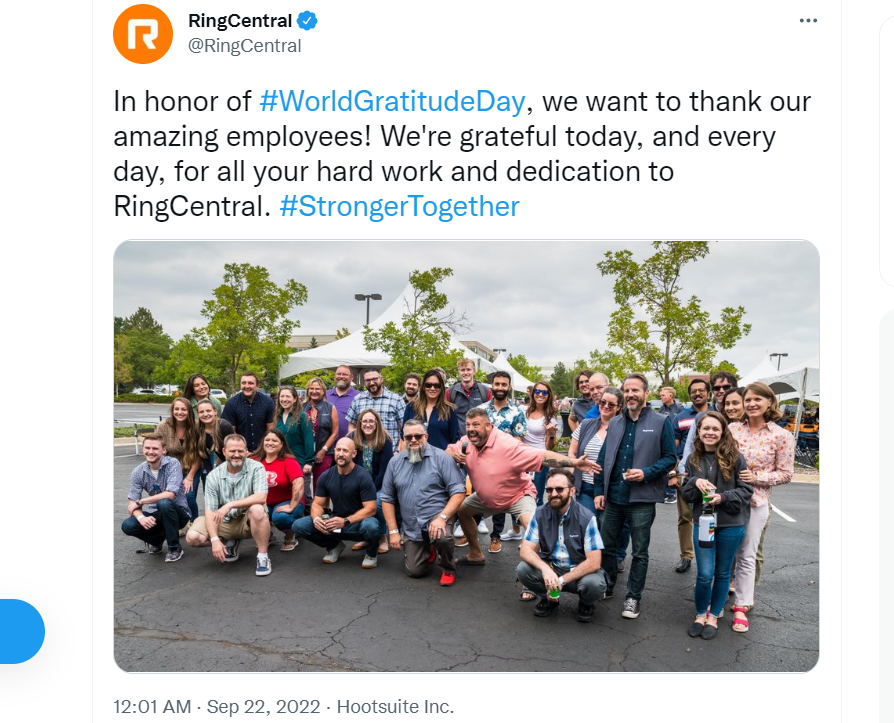
As a result, 84% of RingCentral employees report they are happy with their work-life balance.
The main takeaway here is that developers must strike a balance between their professional and personal lives in order to be happy and satisfied with the job.
Therefore, providing them with the best possible conditions for work and leisure is a necessity for any company that today wants to retain its developers in the long term.
Flexible working conditions
The traditional 9-to-5 workday is a thing of the past.
Today developers want to be able to work wherever and whenever they please—so long as their job gets done.
In other words, flexibility is no longer an extra perk—it’s expected.
But let’s look at statistics to get a better understanding of how exactly developers feel about flexible work arrangements.
Work flexibility is the most important factor in deciding whether or not to stay at a job (65%), even more so than salary (59%), according to Stack Overflow.
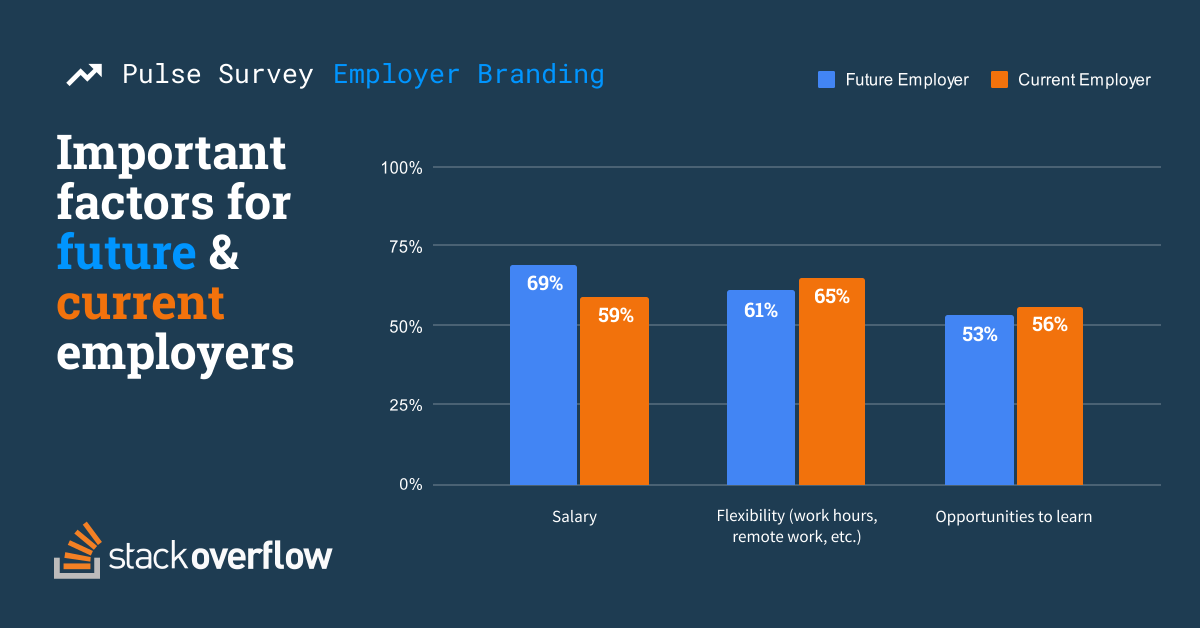
The same survey found out that 56% of developers would be turned off by companies that required them to start and end their work day at a precise time, while 50% state that being forced into going into an office instead of working remotely makes the company far less appealing.

Many companies have already jumped on the bandwagon and offered flexible work arrangements to their employees.
Microsoft is one of those companies, and below you can see some of its employees who have benefited from this initiative.
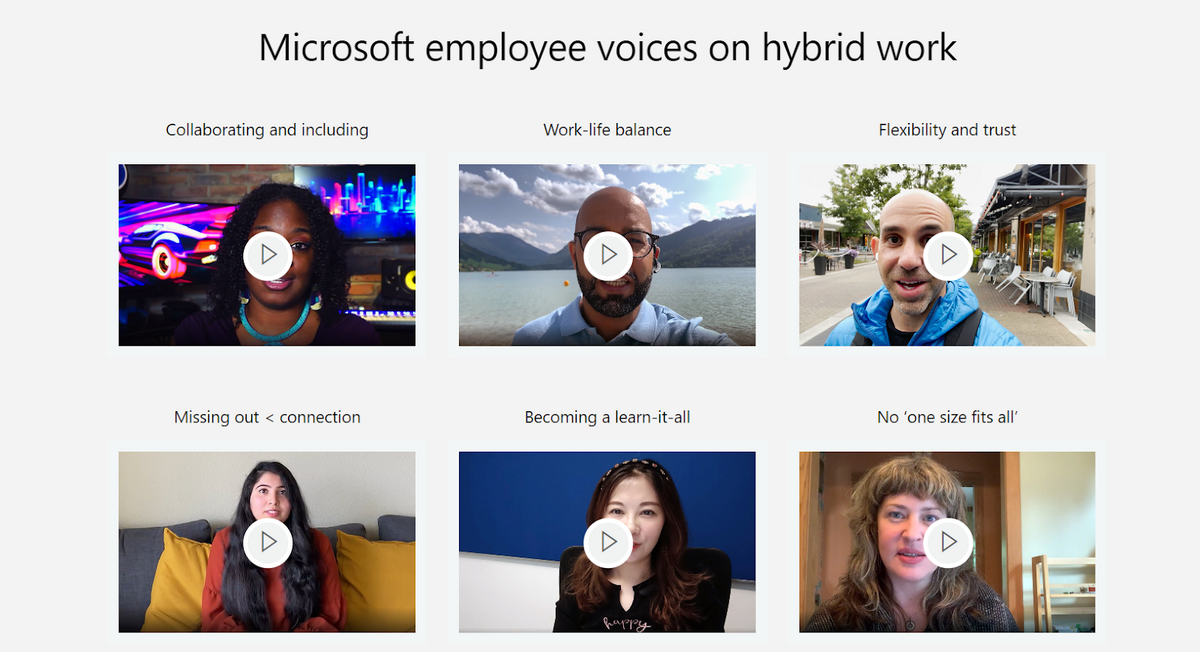
It has to be noted that the majority of other tech companies have already embraced flexibility as the new standard simply because it is good for business on many levels.
Not only are the developers more productive and satisfied, but the companies get to cut down on the costs associated with office space and maintenance.
Therefore, it’s a win-win situation for all parties involved.
Conclusion
In recent years, many developers have begun to expect more than just a paycheck from their employers.
They want to work for companies that offer a good culture, opportunities for growth and learning, as well as the flexibility to ditch the 9-5 when needed—and reward them with competitive pay.
In this article, we’ve tried to summarize the most common perks and benefits software developers want to see in their jobs.
Hopefully, it will help you better understand their expectations so that you can attract more talented employees and keep them around longer.




